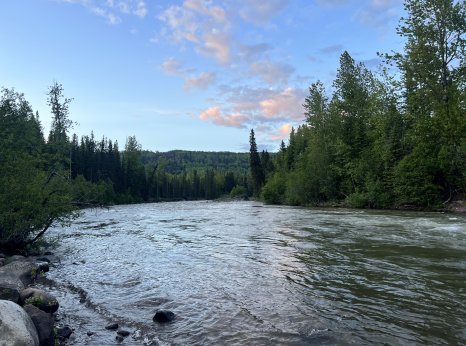Canada: Halt Pipeline Project With Outdated Permit

The Prince Rupert Gas Transmission (PRGT) project is a 900-kilometre, 48-inch diameter pipeline that would ship liquified natural gas (LNG) from Hudson’s Hope in northeastern British Columbia to a proposed LNG export facility on BC’s northwestern coast whose exact location is yet to be confirmed by the provincial government. The Prince Rupert Gas Transmission Holdings Ltd. and the Prince Rupert Gas Transmission Limited Partnership (PRGT Ltd.) is currently owned by the Nisga’a Nation and Western LNG LLC.
The British Columbia Environmental Assessment Office (BC EAO) approved the PRGT project’s environmental assessment certificate on 25 November 2014 (allowing the project to go forward), based on environmental assessments that were undertaken that year and in years prior. The BC EAO approved the certificate despite the fact that its assessment found that the project would have significant adverse effects on caribou and greenhouse gas emissions. At the time the PRGT project received its environmental assessment certificate, the pipeline’s proposed endpoint was the Pacific Northwest LNG terminal on Lelu Island, however, the terminal project was cancelled in 2017 before construction began on either PRGT or Pacific Northwest LNG. In 2024, PRGT Ltd. applied to the BC EAO to change the endpoint of the pipeline to the proposed Ksi Lisims LNG terminal on Pearse Island; a terminal that is currently undergoing an environmental assessment and has not yet been approved by the BC Government. In other words, the PRGT pipeline does not currently have an approved end point. If the request to change the endpoint of the pipeline to the Ksi Lisims LNG terminal is approved and that terminal receives approval from the BC Government, the PRGT’s pipeline’s route would also change meaning that the environmental assessments undertaken by the companies in 2014 and earlier would no longer be representative of the pipeline’s new route.
In 2019, the PRGT project received a one-time extension of its environmental assessment certificate which stipulates that the project must be substantially started by 25 November 2024. In accordance with the BC EAO’s Substantial Start Determination Policy, if the PRGT project is “substantially started” by 25 November 2024, the environmental assessment certificate will remain in effect for the lifetime of the project, a determination which the BC EAO is due to make. If the project is not started by that date, the environmental assessment certificate will expire. Some clearing of the forest for the PRGT pipeline began on 24 August 2024.
Circumstances have changed significantly since the 2014 environmental assessment of the project. Since that time, the province of British Columbia has introduced more stringent air quality standards and superior greenhouse gas emission targets. Economic and environmental conditions have changed, and climate change is escalating. Local rivers are warmer and have less water, salmon and other fish and wildlife populations are at higher risk, and more frequent wildfires are having an increasing impact on the region. Moreover, construction of the PRGT pipeline has begun even though the project does not have an approved endpoint, and the current environmental assessment certificate is based on a route that ends on Lelu Island which will no longer be the case if the project goes forward.
PRGT’s proposed route passes through the unceded, ancestral territories of several Indigenous Nations. Since construction began on the project in August 2024 numerous Nations, including the Gitanyow, Gitxsan and members of the Nisga’a have voiced their opposition to the project being permitted to proceed on environmental assessments that are over a decade old. Both the Gitanyow and Gitxsan has erected blockades along the proposed pipeline route to prevent construction from advancing. Several court cases have been filed against the PRGT project, as well as the proposed Ksi Lisims LNG terminal project.
The governments of Canada and British Columbia have the duty to halt the licensing of new projects extracting fossil fuels, as well as the obligation to carry out comprehensive and timely environmental and social impact assessments prior to approving projects, and to share these with Indigenous Peoples as part of the consultation process in order to obtain their free, prior and informed consent. They have the obligation to consult and cooperate in good faith with Indigenous Peoples through their own representative institutions in order to obtain their free and informed consent prior to the approval of any project affecting their territories and other resources. The duty to consult should be an ongoing process of dialogue and negotiation which takes place over the course of a project, from the earliest stages of project planning to implementation and follow-up.